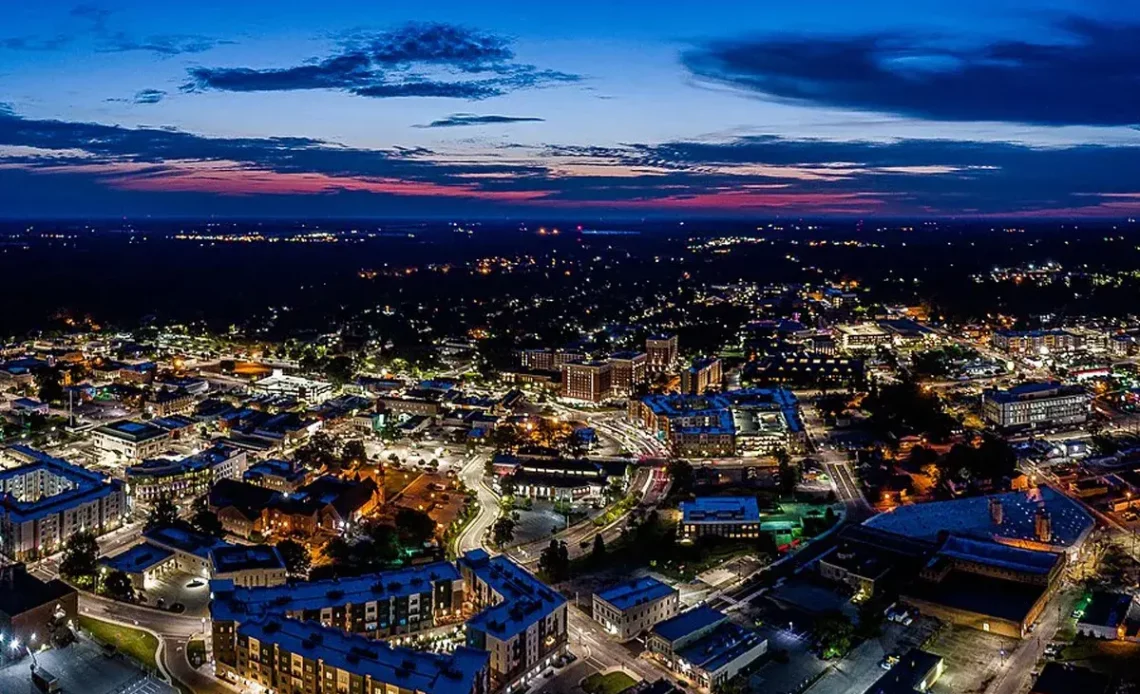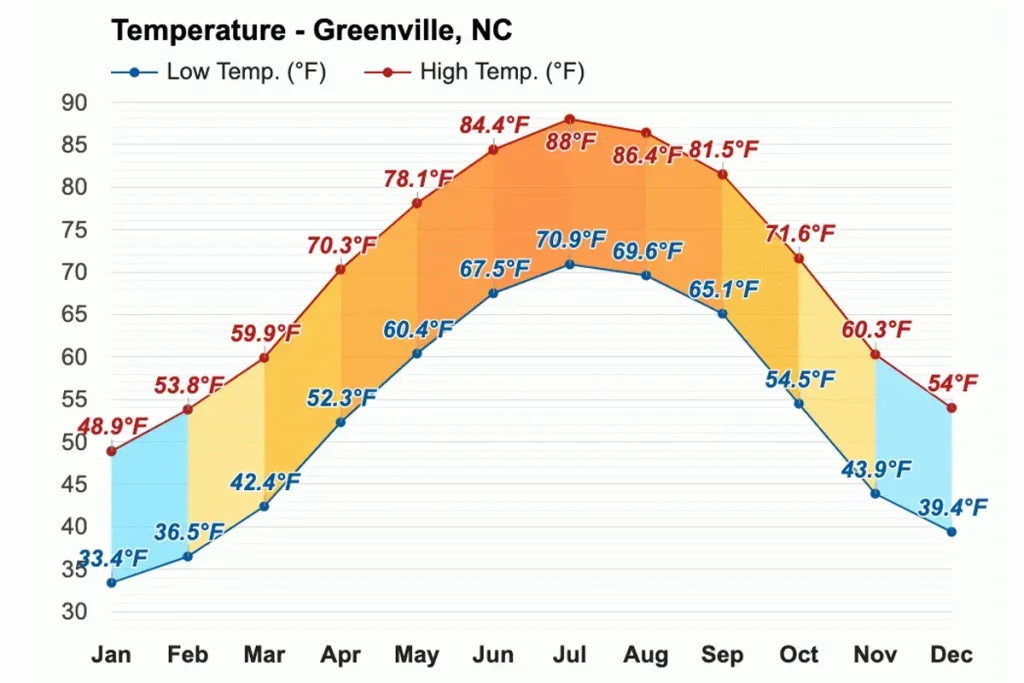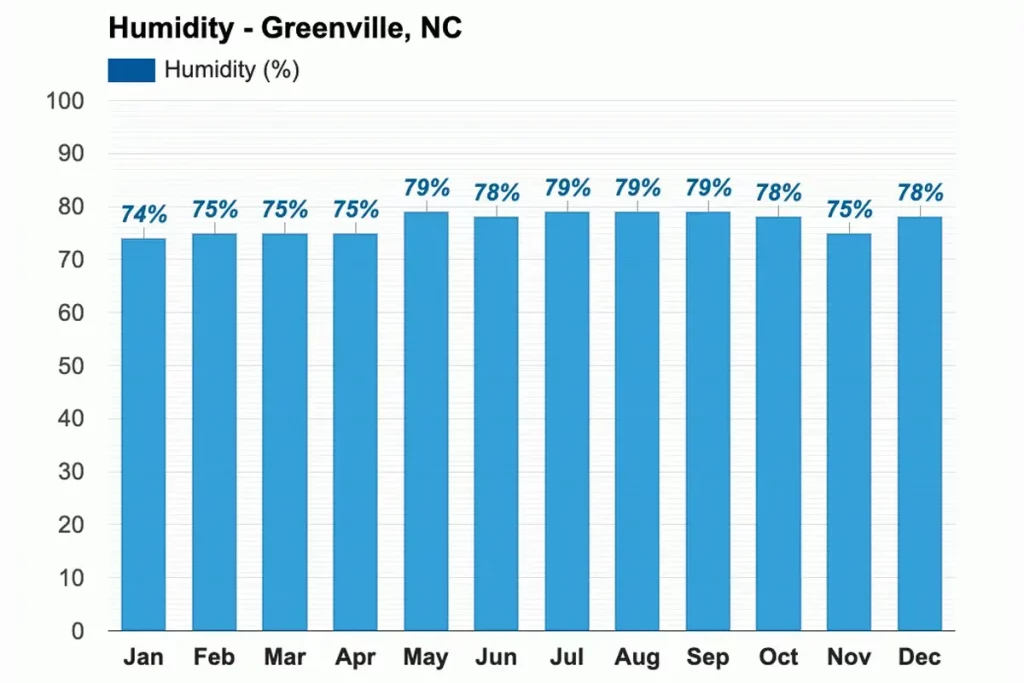
Greenville, North Carolina, nestled in the heart of the state’s coastal plain, experiences a varied climate throughout the year. Understanding the weather patterns in Greenville is crucial for residents and visitors alike to prepare for and navigate the ever-changing conditions. From scorching summers to chilly winters, Greenville’s weather offers a diverse range of experiences. Let’s delve into what makes Greenville’s weather unique and how it impacts the lives of its inhabitants.
Understanding Greenville NC Weather
Greenville, North Carolina, is a city where the weather plays a pivotal role in shaping daily life, local economies, and community activities. Understanding the intricacies of Greenville’s weather goes beyond mere meteorological curiosity—it’s essential for residents, businesses, and visitors alike.
Location and Geography of Greenville
Greenville’s geographical location within North Carolina’s coastal plain region significantly influences its weather patterns. Situated inland, the city is shielded from direct coastal impacts but still experiences the effects of nearby bodies of water and surrounding landforms. Its proximity to the Atlantic Ocean contributes to its moderate climate, with influences ranging from oceanic moisture to storm systems originating over the water.
Climate Classification of Greenville
Greenville falls under the classification of a humid subtropical climate. This classification is characterized by hot, humid summers and mild winters, with relatively consistent precipitation throughout the year. Factors such as latitude, prevailing winds, and geographic features contribute to Greenville’s climate, shaping its temperature ranges, precipitation patterns, and overall weather characteristics.
Seasonal Weather Patterns in Greenville
Each season in Greenville brings its own distinct weather patterns, offering a diverse range of experiences throughout the year. Summers are typically long, hot, and humid, with temperatures often soaring into the 90s Fahrenheit (32-35°C). Winters are milder, with average temperatures ranging from the 40s to 50s Fahrenheit (4-15°C). Spring and fall offer transitional periods characterized by mild temperatures and fluctuating weather conditions, making them popular seasons for outdoor activities and events.
Weather Phenomena Unique to Greenville
Greenville’s inland location and surrounding geographical features contribute to several weather phenomena that are unique to the region. The city’s position away from the coast shields it from direct coastal weather effects but exposes it to continental weather patterns. As a result, Greenville experiences occasional extremes, such as heatwaves in summer and cold snaps in winter, influenced by the surrounding landmass and prevailing wind directions.

Historical Weather Trends in Greenville
Examining historical weather data provides valuable insights into long-term trends and patterns in Greenville’s climate. Over the years, the city has experienced fluctuations in temperature, precipitation, and extreme weather events, reflecting broader climatic variations and trends. Notable weather events, including hurricanes, tornadoes, and severe thunderstorms, have left their mark on Greenville’s history, shaping local perceptions of weather risks and resilience.
Local Weather Forecasting Resources
Greenville benefits from a range of local weather forecasting resources, including government agencies, private meteorological firms, and academic institutions. These organizations employ various tools and technologies, such as weather radar, satellite imagery, and computer models, to provide accurate and timely forecasts tailored to the city and its surrounding areas. Access to reliable weather information is essential for residents, businesses, and emergency responders to prepare for and respond to changing weather conditions.
Effect of Weather on Daily Life in Greenville
Weather conditions have significant implications for daily life in Greenville, impacting various sectors such as agriculture, tourism, and outdoor recreation. The agricultural industry relies on favorable weather conditions for crop cultivation and livestock management, while the tourism sector thrives on pleasant weather for outdoor activities and events. Infrastructure and transportation systems can be affected by weather-related hazards, such as flooding or severe storms, highlighting the importance of weather resilience and preparedness measures.
Climate Change and Greenville’s Weather
Observations of climate change effects in Greenville underscore the need for proactive measures to address its impacts on weather patterns and resilience. Rising temperatures, shifting precipitation patterns, and an increased frequency of extreme weather events are among the observed changes attributed to climate change. These changes pose challenges for Greenville’s future weather resilience and adaptation, requiring collaborative efforts to mitigate risks and build community resilience.

Coping Strategies and Adaptation Measures
Greenville’s residents and local authorities have implemented various coping strategies and adaptation measures to address weather-related challenges. These include infrastructure improvements, emergency preparedness initiatives, and public education campaigns aimed at increasing awareness and resilience to weather hazards. Community engagement and collaboration are essential for developing effective adaptation strategies that protect lives, property, and natural resources in the face of changing weather patterns and climate conditions.
Understanding Greenville’s weather is not merely about predicting whether to bring an umbrella or wear sunscreen—it’s about recognizing the complex interplay of geographic, climatic, and atmospheric factors that shape the city’s environment and influence its resilience to weather-related hazards. By understanding and appreciating Greenville’s weather, residents and visitors can better prepare for and adapt to the dynamic conditions that define life in this vibrant city.
Seasonal Weather Patterns in Greenville
Greenville experiences a diverse range of weather conditions throughout the year, with each season bringing its own unique characteristics and challenges.
Summer
Summer in Greenville is typically characterized by long, hot days and warm nights. High temperatures often soar into the 90s Fahrenheit (32-35°C), accompanied by high humidity levels, making it feel even hotter. The summer months also bring frequent afternoon thunderstorms, fueled by the heat and humidity. These storms can bring heavy rain, lightning, and gusty winds, providing temporary relief from the sweltering heat.
Fall
Fall in Greenville is a time of transition, marked by gradually cooling temperatures and changing foliage. Average temperatures begin to moderate, with highs ranging from the 70s to 80s Fahrenheit (21-29°C) and cooler nights dipping into the 50s Fahrenheit (10-15°C). The crisp, cool air and vibrant colors of autumn foliage make it a popular season for outdoor activities such as hiking, apple picking, and fall festivals.
Winter
Winter in Greenville is generally mild compared to other parts of the country, but temperatures can still fluctuate, occasionally dipping below freezing. Average highs range from the 40s to 50s Fahrenheit (4-15°C), with occasional cold snaps bringing temperatures below freezing at night. While snowfall is rare, winter storms can occasionally bring wintry precipitation to the area, causing disruptions to travel and outdoor activities.
Spring
Spring in Greenville is a time of renewal and rejuvenation, as temperatures gradually warm up, and nature comes back to life. Average highs range from the 60s to 70s Fahrenheit (15-25°C), with cool nights in the 40s to 50s Fahrenheit (4-15°C). Springtime also brings an increase in rainfall, helping to replenish soil moisture and support the growth of plants and crops. The season is characterized by blooming flowers, budding trees, and an abundance of outdoor activities, making it a favorite time of year for many residents.
Transitional Periods
The transition between seasons in Greenville can be dynamic, with rapid changes in weather patterns and conditions. For example, the transition from winter to spring may bring fluctuating temperatures, occasional frost, and the risk of late-season cold snaps. Similarly, the transition from summer to fall may bring lingering heatwaves followed by cooler temperatures and the first hints of autumn foliage. Understanding these transitional periods is essential for planning outdoor activities and preparing for changing weather conditions.
Overall, Greenville’s seasonal weather patterns offer a diverse range of experiences throughout the year, from the heat and humidity of summer to the crisp, cool air of fall and the occasional wintry weather of winter. By understanding and appreciating these seasonal variations, residents and visitors can make the most of all that Greenville has to offer, year-round.

Typical Weather Events in Greenville, NC
Greenville, North Carolina, experiences a variety of weather events throughout the year, ranging from mild to severe. Understanding these typical weather events is crucial for residents, businesses, and visitors to prepare and adapt to changing conditions.
Thunderstorms
Thunderstorms are a common occurrence in Greenville, particularly during the warmer months. These storms are often accompanied by lightning, thunder, heavy rain, and sometimes hail. While most thunderstorms are relatively benign, some can become severe, producing strong winds, large hail, and even tornadoes. Residents should stay informed about weather forecasts and be prepared to take shelter during severe thunderstorm warnings.
Hurricanes and Tropical Storms
Greenville is located inland, but it is not immune to the impacts of hurricanes and tropical storms that affect the coastal areas of North Carolina. While the city may not experience the full force of these storms, it can still face heavy rain, strong winds, and the risk of flooding. Residents should have a hurricane preparedness plan in place, including securing outdoor items, stocking up on supplies, and heeding evacuation orders if necessary.
Winter Weather
While winters in Greenville are generally mild, the city can still experience occasional winter weather events. These may include cold fronts bringing freezing temperatures, as well as winter storms bringing snow, sleet, or freezing rain. While snowfall is relatively rare, even a small amount can cause travel disruptions and hazardous road conditions. Residents should be prepared for winter weather by keeping emergency supplies on hand and staying informed about weather forecasts.
Heatwaves
During the summer months, Greenville often experiences heatwaves, with temperatures soaring into the 90s Fahrenheit (32-35°C) or higher. High humidity levels can make it feel even hotter, increasing the risk of heat-related illnesses such as heat exhaustion and heatstroke. Residents should take precautions during heatwaves by staying hydrated, seeking shade or air-conditioned spaces, and avoiding strenuous outdoor activities during the hottest parts of the day.
Flooding
Greenville is susceptible to flooding, particularly during heavy rain events or when tropical systems bring excessive rainfall to the region. Urban areas, low-lying areas, and areas near rivers and streams are most at risk. Flash flooding can occur suddenly and without warning, posing dangers to life and property. Residents should be aware of flood risks in their area, have a plan for evacuation if necessary, and avoid driving through flooded roadways.
Tornadoes
While tornadoes are relatively rare in Greenville compared to other parts of the state, they can still occur, especially during severe thunderstorms or tropical systems. Tornadoes can cause significant damage to buildings and infrastructure, as well as pose a threat to public safety. Residents should have a plan in place for tornadoes, including identifying a safe shelter area and staying informed about tornado warnings.
By understanding and preparing for these typical weather events, residents of Greenville can better protect themselves, their families, and their property from the impacts of changing weather conditions throughout the year. It’s essential to stay informed about weather forecasts and warnings, have a plan in place for emergencies, and take proactive measures to ensure safety and resilience in the face of unpredictable weather.
Impact of Weather on Daily Life
The weather plays a significant role in the daily lives of Greenville residents. From outdoor activities to commuting, weather conditions influence various aspects of life in the city.
Weather Preparedness Tips
To stay safe and comfortable in Greenville’s ever-changing weather, residents should follow these essential preparedness tips:
- Stay Informed: Keep an eye on local weather forecasts and advisories.
- Prepare Your Home: Ensure your home is equipped to handle severe weather, such as securing loose outdoor items and having an emergency kit on hand.
- Plan Ahead: If severe weather is forecasted, plan your activities accordingly and avoid unnecessary travel.
- Stay Hydrated: During hot summer days, stay hydrated and avoid prolonged exposure to the sun.
- Dress Appropriately: Layer clothing in the winter months and wear sunscreen during the summer to protect against sunburn.
Weather Forecasting in Greenville
Meteorologists use a variety of tools and techniques to forecast the weather in Greenville accurately. These include radar, satellite imagery, computer models, and local observations.
Tools and Resources for Weather Information
Residents can stay informed about Greenville’s weather through a variety of sources, including:
- Local news stations
- National Weather Service
- Weather apps and websites
- Social media channels of local meteorologists
Extreme Weather Events
While Greenville typically experiences mild weather, it is not immune to extreme events such as hurricanes, tornadoes, and flooding. Being prepared and having a plan in place is essential during these emergencies.
Climate Change and Its Effects on Greenville’s Weather
Climate change is causing shifts in weather patterns worldwide, and Greenville is no exception. Rising temperatures, changing precipitation patterns, and more frequent extreme weather events are all potential consequences of climate change in the area.
Community Response to Weather Challenges
The Greenville community is resilient and proactive when it comes to addressing weather-related challenges. From emergency preparedness initiatives to sustainable urban planning, efforts are underway to mitigate the impact of weather events on the city and its residents.
Future of Greenville’s Weather
As climate change continues to influence weather patterns, the future of Greenville’s weather remains uncertain. However, with proper planning and community engagement, the city can adapt to these changes and thrive in the years to come.
Conclusion
Greenville, NC, experiences a diverse range of weather throughout the year, from hot summers to mild winters. Understanding and preparing for these weather patterns is essential for residents and visitors alike. By staying informed, planning ahead, and taking appropriate precautions, individuals can stay safe and comfortable in Greenville’s ever-changing climate.
FAQs (Frequently Asked Questions)
- Is snow common in Greenville, NC?
- While snow is relatively rare in Greenville, the city does experience occasional snowfall during the winter months.
- Are hurricanes a concern in Greenville?
- Greenville is inland, but hurricanes can still bring strong winds and heavy rainfall to the area, especially during the Atlantic hurricane season.
- What is the hottest time of year in Greenville?
- Summer is typically the hottest time of year in Greenville, with temperatures often reaching into the 90s Fahrenheit (32-37°C).
- Does Greenville experience tornadoes?
- Tornadoes are rare in Greenville, but they can occur, especially during severe weather outbreaks.
- How can I stay informed about Greenville’s weather?
- Residents can stay informed about Greenville’s weather through local news stations, the National Weather Service, weather apps, and social media channels of local meteorologists.
